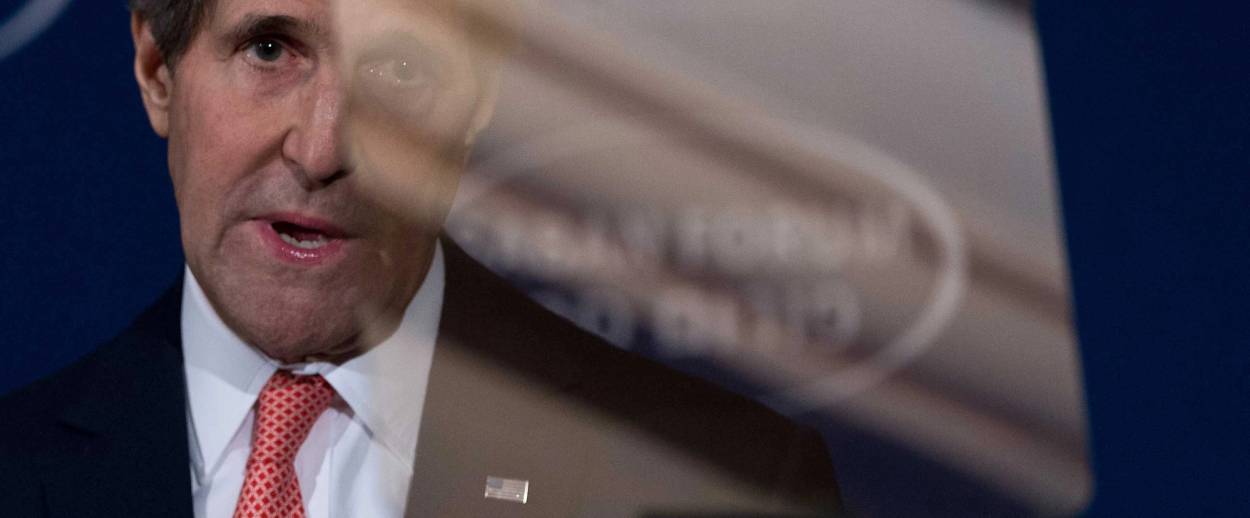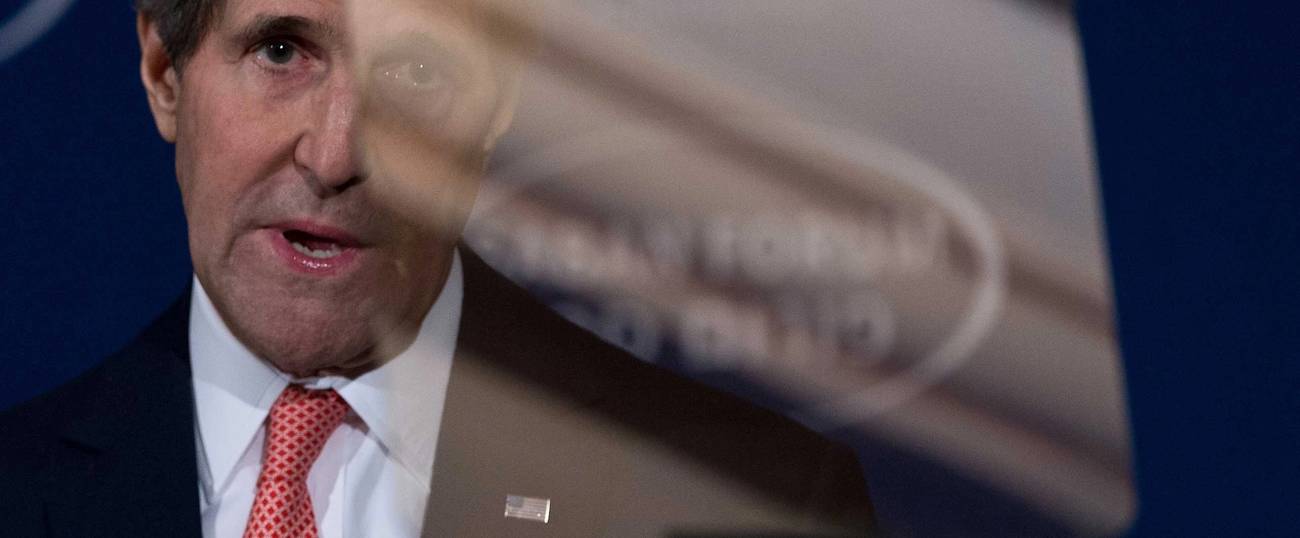John Kerry Searches for a Sign on Palestine at the Saban Forum
The Obama administration’s chief diplomat is the man with two brains




There’s a scene in Steve Martin and Carl Reiner’s 1983 comedy The Man with Two Brains in which Martin’s character, the brilliant brain surgeon Dr. Michael Hfuhruhurr (a lot of people mispronounce it, but it sounds just the way it’s spelled) goes before the portrait of his deceased wife to ask if there’s anything wrong with his getting married again. “Just give me a sign,” he plaintively asks. The house begins to shake, the walls crack, lamps explode, winds begin to blow, the portrait spins around, and a voice screams, “No! No! Nooooooooooooooo!”
After things have quieted down, Hfuhruhurr, his hair, clothes, and house a mess, and still staring at the portrait as if nothing has happened, says, “Just any kind of sign. I’ll keep on the lookout for it.”
Watching Secretary of State John Kerry’s remarks at the Brookings Institution’s Saban Forum earlier this month, it occurred to me that he and other administration officials have basically been re-enacting that scene for the past year.
The Saban Forum, named for its benefactor, Democratic Party mega-donor Haim Saban, is the annual D.C. confab for Israeli and American politicians and policy wonks to rub elbows and discuss the past, present, and future of the U.S.-Israel relationship. In the past years, it’s also been a key venue for top U.S. administration officials to articulate their intentions and concerns about that relationship.
After sidestepping moderator Jeffrey Goldberg’s opening prompt to comment on the Trump transition, Kerry moved to his main subject, the state of affairs in Israel and Palestine. “Can I begin, though, by saying to you that I do feel really passionate, genuinely passionate, about Israel?” Kerry asked. “The land of milk and honey.”
After several paragraphs describing his and President Barack Obama’s commitment to Israel’s security, including the recently signed $38 billion military-aid package—“more than 50 percent of the total that we give to the entire world has gone to Israel”—Kerry moved to precisely what you’d think such throat-clearing portends: a set of criticisms and questions about Israeli policy in the occupied territories.
Kerry premiered this detailed critique at last year’s Saban Forum, and he and other administration officials have repeated it over the past 12 months. It goes like this: Israeli policies in the occupied territories—among them settlement expansion, denial of permits for Palestinian development, demolitions of Palestinian homes—“raise honest questions” about Israel’s commitment to the two-state solution. Therefore, Israel needs to clarify its intentions. As I wrote in Tablet magazine in January, after U.S. Ambassador to Israel Dan Shapiro issued the same critique and received a sharp Israeli government rebuke, having made these criticisms, what was the administration going to do about it?
Over the past year, we found out: They’re going to keep “raising questions about Israel’s long term objectives.” Over and over and over again—as Kerry did yet again on Sunday. And what has occurred in the intervening year? In the months immediately after Kerry first posed these questions last December, settlement starts shot up by 40 percent. Demolition of Palestinian homes reached a record high in 2016. And last week, the Knesset gave preliminary approval to a law that would retroactively legalize thousands of settler homes, many of them built on private Palestinian land. The Jerusalem Post called it a “revolutionary moment” that “could be the first step toward annexation of Area C of the West Bank, and which would overturn almost 40 years of judicial rulings on private Palestinian property rights.”
If this isn’t a spinning portrait, I don’t know what is.
It’s pretty clear by now what the Netanyahu government’s intentions are: to entrench Israeli control over the West Bank while penning the Palestinians within a series of disconnected cantons over which they’re allowed to fly their flag, and call that “sovereignty.” Netanyahu’s assurances that he still supports a two-state solution notwithstanding, the actual policy on the ground tells a different story.
This may have been smart approach on the part of the administration initially, to seek clarity on policy. But if you’re not going to accept the answer when it’s staring you in the face, why bother? Why issue increasingly agitated warnings if you’re not going to do anything about them? By doing so, the administration has done little more than advertise its own failure. (There’s also the question of credibility: Critics of Obama’s Syria policy imbue his decision not to enforce the “red line” with fantastical explanatory power, but rarely is it discussed that maybe the U.S. failing to hold a client state accountable over an issue of such overwhelming international consensus might have a similar credibility-busting effect.)
In his final speech to the United Nations General Assembly, Obama said that Israelis and Palestinians would all be better off when the Palestinians accept Israel (which they already did) and “Israel recognizes that it cannot permanently occupy and settle Palestinian land.” But his presidency, perhaps more than any other, by refusing to countenance any consequences for settlement violations while at the same time dramatically increasing military aid and other forms of support, has shown the pro-settlement right that they can do just that, without any fear of meaningful consequences from the United States.
The administration has one last shot at changing this dynamic. One option would be supporting a set of parameters outlining an internationally backed vision of a final agreement, preparing the table for an eventual return to negotiations. But there’s also an option requiring less administration time and attention (which, we should acknowledge, can be better applied to protecting other aspects of the administration’s legacy from an incoming Trump administration): Supporting, or at least not vetoing, a U.N. Security Council resolution on settlements. As administration officials have rightly said, the settlements are not the only challenge to peace-making. They do, however, represent a unique threat to a two-state outcome, over which Palestinians have zero control or recourse. Removing the sense of impunity that Israel clearly feels over its settlement enterprise, and adding the missing ingredient of real consequences for their continued growth, is something that could actually shift the dynamic.
But even if it’s not willing to take that step, the administration can at the very least announce that it’s received an answer to its question. Or, 10 years from now, when the Palestinian bantustans have long become accepted as the new normal, Kerry could still be asking for a sign, any kind of sign.
***
You can help support Tablet’s unique brand of Jewish journalism. Click here to donate today
Matthew Duss is president of the Foundation for Middle East Peace, based in Washington, DC.